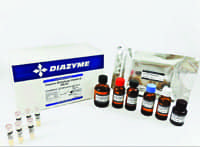A portable and rapid prostate cancer screening kit could provide early warning to populations with higher incidence of prostate cancer and particularly those with limited access to health care, such as African Americans.
The proof-of-concept test, described online in the journal Current Research in Biotechnology, is inexpensive and uses a test strip and a small cube-shaped 1.6-inch reader to quantify a marker of prostate cancer—called prostate-specific antigen (PSA)—from a drop of blood in minutes.
“We’ll be able to take a drop of blood in a community setting such as a barbershop and be able to deliver results in 10 to 15 minutes right there, which can indicate when somebody needs to come in for further tests,” says Saurabh Mehta, MS, ScD, the Janet and Gordon Lankton Professor in the Division of Nutritional Sciences and the paper’s senior author. Balaji Srinivasan, PhD, a research associate in Mehta’s research group, is the paper’s first author.
The kit comes with a test strip, in which users would draw a drop of blood and apply it to the test strip and two lines appear on the strip.
The color of the two lines is due to 150-nanometer gold nanoshells, which greatly enhance the test’s sensitivity to detect PSAs and make the lines appear more intense in their presence, Srinivasan says. The cube reader is able to sense the intensity of the test strip lines and then calculates and displays a measurement of PSA concentration in the blood.
“Another advantage of test strips is that the technology to make them really cheap or mass produce them has been around for many years,” says Srinivasan.
African American men frequently do not have access to prostate cancer PSA screening and are diagnosed with more advanced prostate cancer, contributing to disproportionately higher mortality rates.
“There is a need for increasing access to PSA screening among African American men who are otherwise not able to get tested periodically, and one of the ways is we take the test to them at various community settings,” Srinivasan says.
The study was funded by the National Institutes of Health. The team also recently received a notice of award from the Department of Defense to further develop this area of research and test the device in certain underserved neighborhoods in New York, in partnership with Weill Cornell Medicine colleagues Erica Phillips, MD, associate professor of clinical medicine the Jack Fishman Associate Professor of Cancer Prevention; Rulla Tamimi, ScD, professor of population health sciences; and Kevin Kensler, MHS, ScD, assistant professor of population health sciences.
The Division of Nutritional Sciences is housed jointly within the College of Human Ecology and College of Agriculture and Life Sciences.
Featured image: PC-3 human prostate cancer cells, stained with Coomassie blue, under differencial interference contrast microscope.





